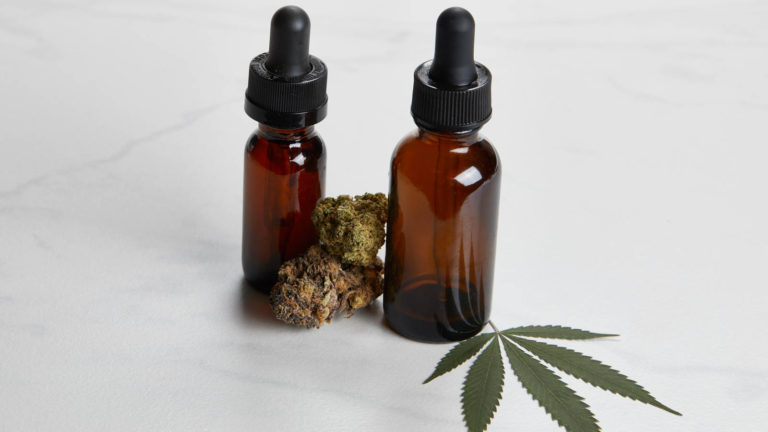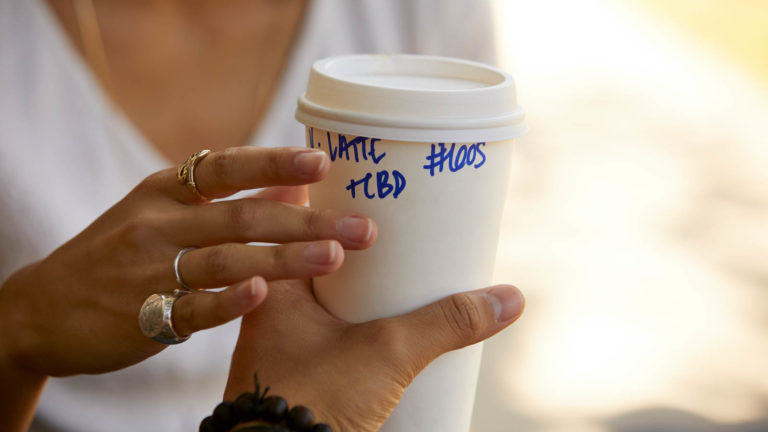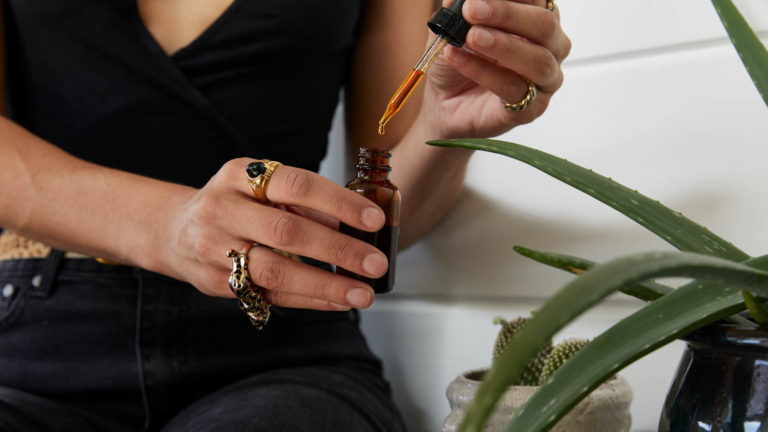No, cannabidiol (CBD) oil is not legal for purchase or possession except for patients who qualify for Iowa's medical marijuana program. CBD products are available in five state-licensed dispensaries.
In late 2018, U.S. Congress passed the Farm Bill, an act which redefined hemp as an agricultural commodity and removed CBD and hemp products from the controlled substances list. This law is a promising step towards federal legalization, but left many confused about CBD's legality at the state level.
Consumers are confronted with a legal limbo where CBD is federally legal, but outlawed in Iowa until the state's hemp plan is approved by the federal government. Iowa regulators passed SF 599, the Iowa Hemp Act, which was signed by Republican Gov. Kim Reynolds in May 2019. Yet state law still classifies CBD as a controlled substance. Further, the existence of Iowa's medical cannabis program complicates many Iowans' understanding of what is or isn't allowed.
What is CBD?
CBD, short for cannabidiol, is the second-most-abundant molecule in cannabis after tetrahydrocannabinol (THC). A non-intoxicating compound, CBD shows evidence of therapeutic potential in fighting inflammation, reducing anxiety, suppressing seizures and relieving pain. CBD can be derived from either hemp or marijuana plants.
 Photo by: Gina Coleman/Weedmaps
Photo by: Gina Coleman/WeedmapsImage lightbox

Why is CBD sometimes illegal?
In 1970, the Federal Controlled Substances Act categorizes all cannabis, including industrial hemp, as a Schedule 1 narcotic, which deemed cannabis as a substance with no accepted medical use and a high potential for addiction and abuse.
Decades later, Congress passed the 2018 Farm Bill, legalizing hemp cultivation and hemp-derived CBD products. The Farm Bill defined hemp and marijuana using a THC content threshold: hemp contains 0.3% THC by weight; marijuana has more than 0.3% THC. This distinction removed hemp-derived CBD from its Schedule 1 classification, though CBD extracted from marijuana is still federally illegal. The Farm Bill also classified hemp as an agricultural commodity and instructed the U.S. Department of Agriculture (USDA) to draft regulations and oversee hemp's production and sale.
The Food and Drug Administration (FDA) was also tasked with regulating the labeling of CBD products, therapeutic claims, and whether CBD is permitted in any food or beverage product. In early 2019, the FDA stated that no food or beverage products or products marketed as a dietary supplement could contain CBD. While the FDA has begun re-evaluating this stance, it hasn't issued official rules.
The FDA hasn't moved swiftly to draft national regulations. Meanwhile, individual states are interpreting the Farm Bill. The FDA has upheld strict standards when product labels make medical claims.
 Photo by: Gina Coleman/Weedmaps
Photo by: Gina Coleman/WeedmapsImage lightbox

The Farm Bill also empowers individual states to issue their own regulations alongside national law, up to and including CBD's total prohibition. Iowa, in particular, has stated that it will wait for U.S. approval of any state-drafted hemp rules before it adopts the new legal definition of CBD.
Iowa CBD laws
In 2014, the Iowa legislature passed SF 2360, known as the Iowa Medical Cannabidiol Act, to allow individuals diagnosed with intractable epilepsy to use CBD products with 3% or less THC by weight. However, Iowa patients had no means of purchasing their medicine within the state.
In 2017, Republican Gov. Terry Branstad signed into law a newer version of the Iowa Medical Cannabidiol Act. HF 524 expanded qualifying conditions for patients and tasked the Iowa Department of Public Health (IDPH) with creating a regulatory framework for CBD manufacturing and sales. As of December 2018, patients with a medical cannabidiol registration card could legally purchase CBD products at one of five licensed dispensaries in Iowa.
Iowa has yet to redefine CBD to meet the federal definition put forth by the 2018 Farm Bill. By signing the 2019 Iowa Hemp Act, Reynolds tasked the Iowa Department of Agriculture and Land Stewardship (IDALS) with drafting an industrial hemp program to be approved by the USDA. Once approved, the IDALS will oversee the regulation of hemp and CBD products in Iowa.
Until then, CBD products remain illegal in Iowa. In July 2019, Democratic Attorney General Tom Miller issued a statement reminding the public that CBD products are still illegal unless the products are grown, sold, and possessed in participation with the Iowa Medical Cannabidiol program. CBD is still a Schedule 1 substance, excepting the four FDA-approved CBD products such as Epidiolex.
Licensing requirements for CBD
The IDALS is currently drafting proposed regulations for an Iowa hemp program, to be approved by the USDA before enactment.
 Photo by: (Gina Coleman/Weedmaps)
Photo by: (Gina Coleman/Weedmaps)Image lightbox

The Iowa Medical Cannabidiol Program has licensed one manufacturer, MedPharm Iowa, to produce CBD products for registered patients to purchase at one of five licensed dispensaries: MedPharm Iowa was offered dispensary licenses for Sioux City and Windsor Heights. Have a Heart Compassion Care was authorized for Council Bluffs and Davenport, and Iowa Cannabis Company operates in Waterloo. Dispensaries began selling medical cannabis products to registered patients in December 2018.
The IDPH currently is not accepting new applications for manufacturing or dispensary licenses.
Testing requirements
There are currently no requirements for CBD lab testing outside of the medical cannabidiol program, as the cultivation and sale of any CBD products other than licensed by the IDPH is illegal.
State law requires laboratories to establish and implement test methods and standard operating procedures for the testing of cannabinoids, microbiological impurities, pesticides, residual solvents and processing chemicals, and metals. All testing labs must, at a minimum, test for and report measurements for the following cannabinoids: THC, tetrahydrocannabinolic acid (THCA), CBD, cannabidiolic acid (CBDA), cannabigerol (CBG), and cannabinol (CBN).
Sale regulations
Only five dispensaries licensed by the IDPH can sell medical cannabidiol products to patients with a valid registration card.
The unlicensed sale of CBD or of any cannabis product is punishable by law with tiered penalties depending on the severity of the offense. The sale of less than 50 kilograms, or 110 pounds, is a felony punished by five years in prison and a $7,500 fine; 50-100 kilograms, or 110-220 pounds is punishable by up to 10 years in prison and a $50,000 fine. The sale of 100-1,000 kilograms, or 220-2,205 pounds, is punishable by up to 25 years in prison and a $100,000 fine. The sale of any amount more than 1,000 kilograms, or 1.1 tons, can earn up to 50 years in prison and a $1 million fine.
 Photo by: Gina Coleman/Weedmaps
Photo by: Gina Coleman/WeedmapsImage lightbox

The sale of cannabis involving a minor, or within 1,000 feet of a school or other public place, can incur a sentence between five to 25 years in prison and up to $100,000 in fines.
Cultivation requirements
The home cultivation of any kind of cannabis is illegal in Iowa. Cultivation without a license is punished by the same violation tiers as the illegal sale of cannabis.
Iowa CBD possession limits
The possession of CBD is legal only for medical marijuana patients with a qualifying medical condition and valid medical cannabidiol program registration card. The CBD product must be purchased from a licensed Iowa dispensary and contain less than 0.3% THC. CBD products may be taken only orally or transdermally, and smoking or vaporizing CBD are prohibited.
Illegal possession of any amount of cannabis is a misdemeanor punishable by tiers of incarceration and fines depending on initial or subsequent offenses. A first offense carries a sentence of up to six months in jail and a $1,000 fine. A second offense is punishable by up to one year in jail and a $1,875 fine, and a third offense scales up to two years of jail time and a $6,250 fine.
How to read CBD labels and packaging
Only medical CBD is legal in Iowa, which has issued extensive labeling requirements for the products. In addition to detailed rules about tamper-resistant packaging, the state requires labels that list the name and address of the manufacturer where the medical cannabidiol was manufactured; the medical cannabidiol's primary active ingredients; directions for use, including recommended and maximum amount by age and weight; date of expiration; and storage instructions.

